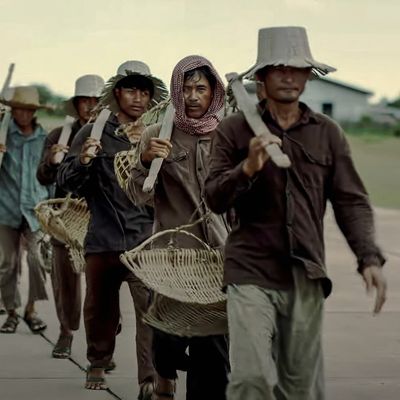
Meeting With Pol Pot.
Photo: Strand Releasing/Courtesy Everett Collection
## Exploring the Depths of History: A Review of *Meeting With Pol Pot*
In **Rithy Panh’s** latest cinematic endeavor, *Meeting With Pol Pot*, the Cambodian director, who tragically lost his family to the Khmer Rouge genocide, dives deep into the dark well of his nation’s past. This powerful film intertwines **historical drama** and **journalistic inquiry**, revealing the disillusionment and ideological clashes that shaped Cambodia under Pol Pot’s brutal regime.
### A Grim Historical Context
Rithy Panh, acclaimed for films like *The Missing Picture*, brings to life the harrowing era of the Khmer Rouge through a **fictionalized portrayal** of three foreign journalists visiting Cambodia in 1978. This was a time when the nation was sealed off from global scrutiny following the Khmer Rouge’s ascension to power in 1975. The backdrop is not simply historical; it serves as **a lens to explore contemporary truths** and the complexities of belief systems.
### An Unlikely Traveler: Alain Cariou
Among the trio is **Alain Cariou**, played by Grégoire Colin, a charismatic socialist academic eager to understand the utopian vision of “Democratic Kampuchea.” Despite the mounting evidence of atrocities—torture, mass executions, and starvation—Cariou is entranced by what he perceives as a new societal order.
> His journey raises essential questions: **How do idealistic visions of a better society distort our perceptions of reality?**
Cariou’s naive enthusiasm blinds him to the horrors around him, while the film gradually unveils an unsettling journey from **devotion to disillusionment**.
### The Journalists: Voices of Discontent
The other members of this journalistic trio bring their own perspectives to the fore. **Lise Delbo**, portrayed by Irène Jacob, longs for her lost interpreter from the war years, whereas **Paul Thomas**, played by Cyril Gueï, represents the voice of seasoned skepticism. Paul’s uncomfortable revelations—such as the realization that the bountiful sacks of rice offered by the Khmer Rouge are filled with dirt—underscore the film’s critique of **propaganda** and distortion of truth.
> This exploration of **Kompong Chnnang Airport**, a site steeped in death and despair from its construction, adds an emotional weight to their narrative, forcing viewers to confront the **historical amnesia** surrounding Cambodia’s past.
### Artistic Representation of Horror
Panh’s use of **clay figures**—remnants of his previous work—emphasizes the anguish of the era without resorting to direct portrayal. These figures evoke contemplation rather than outright empathy, forcing audiences to grapple with the **human experience behind the horror**.
> The juxtaposition of artistic representation with **archival footage** further amplifies the poignant message: history must not be sanitized; it should provoke thought, discussion, and most importantly, **remembrance**.
### Meeting Pol Pot: A Chilling Encounter
The film culminates in a haunting meeting with **Pol Pot**, represented as a shadowy figure whose chilling discourse reveals the deep cracks in his ideological foundation. Panh, who voices the Khmer Rouge leader, captures the chilling essence of a man whose extreme beliefs drove countless others to madness and despair.
> “Better an absence of men than imperfect men,” Pol Pot’s words echo long after the film’s resolution, encapsulating the terrifying transformation of idealism into **sociopathic cruelty**.
### Inspiration Behind the Screenplay
*Meeting With Pol Pot* draws inspiration from **Elizabeth Becker’s 1986 book**, *When the War Was Over*, adapting these true stories into a narrative that reflects not just a national tragedy but **universal themes** of belief, betrayal, and existential reckoning.
### Conclusion: A Call to Remember
In a world where historical narratives are often muddied and misconstrued, *Meeting With Pol Pot* serves as a powerful reminder of the need for **historical accountability** and the imperative of remembering the past. Rithy Panh’s masterful storytelling emboldens us to consider how swiftly **idealism can curdle into horror** and urges us to confront the truths we often wish to ignore.
As the credits roll, one is left with an unsettling question: **What lessons from Cambodia’s past can inform our present and future?**
For more insights into the significance of this gripping film, consider exploring other **historical dramas** that tackle similar themes, or delve into the intricacies of Cambodian history through various literary and documentary sources.






